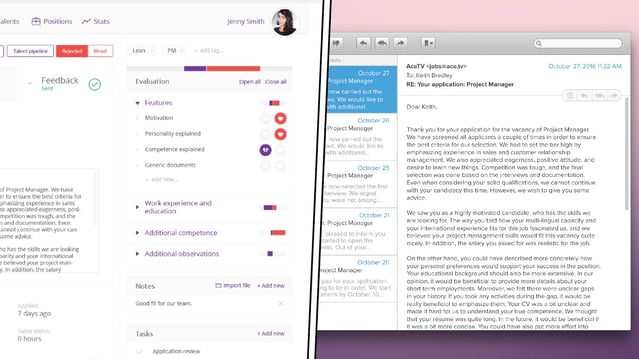
Jan Söderström

Think about Apple’s Siri. Think about Google. Think about smart cars or your favourite online stores. Artificial Intelligence (AI) is already around us and it is making our lives easier by helping us to choose the right route on the road or to make a purchase in online shops.
Similarly, AI can help us in human resource management and in recruiting. Artificial Intelligence may sound scary but I convince you, it will be useful to you as a recruiter also. After all, you aren’t afraid of cars because they are faster than you. Why should you be afraid of computers for processing the information faster than you? My suggestion is that you accept your processing limits as a human and take everything out of the evolving technology.
Human creativity combined with limitless processing power is an unstoppable combination. Discover different technologies that are here and have already begun to revolutionise recruitment industry. Have you used some of them already?
In its simple forms, Machine learning is a form of AI where, by using algorithms, it is possible to parse data, learn and make predictions. Basically the machine is trained with large amount of data and algorithms gives it ability to perform predefined tasks. You may hear about Artificial Intelligence, Machine Learning or Deep Learning, and wonder what is the difference, but they are just subsets of one another: deep learning is a subset for machine learning, while machine learning is a subset of AI. In the picture below, the evolution of AI is described in intelligible way.
To read in-depth article about the differences between AI, Machine Learning and Deep Learning, head to NVIDIA's blog.
Jelpp is a great example of an applicant tracking software that uses machine learning. It is using large amount of existing quality information about the successful hires to find meaningful relationships. In other words it is analysing what kind of education and experience is valued for each of the positions and finding the most promising candidates on behalf of the recruiter. Jelpp analyses the open job position based on the job description and other parameters and compares those to candidates’ applications. After the matching, Jelpp gives you a list of candidates who are most suitable for the open position based on real hiring data. Naturally, you can choose someone outside the given list, but why bother, the AI has done the sourcing and you have just saved hours of your time.
In the future, when the amount of data increases, possibilities will be limitless. Even today it is technically possible to analyse candidates social media profiles or their personal blogs to gain more data about the candidates. If you’d continue updating employees’ performance after they got chosen to a certain position, you would teach the AI further and it could predict future candidates’ success in advance. Basically, the algorithm could make prediction about what kind of qualities mean that this candidate will stay at your company for long or whether she or he will thrive in the given position.
Natural Language Processing (NLP) is a subfield of computer science, information engineering, and AI concerned with the interactions between computers and human (natural) languages. It's a way for computers to understand and derive meaning from a human language, and it can be used for example to speech recognition, translation or automated question answering.
While chatbots usually are not quite true artificial intelligences, they are a worthy way of communicating with candidates when you have hundreds or even thousands of candidates applying at the same time. It is very important to consider candidate experience and communicate with all of them from the very beginning. But you can’t chat with every candidate all by yourself. Luckily there are many different chatbots to use.
One of the chatbots using both Natural Language Processing and Machine Learning is Mya. Mya is always available to your candidates when they have questions. She provides updates, gives feedback to candidates and guides them through the recruitment process. If I’d be a recruiter, I’d try this out!
Another option to take advantage of Natural Language Processing (NLP) algorithms is to let the algorithm automatically generate feedback to candidates. TalentAdore has created a Virtual Recruitment Assistant that helps recruiters to write fully personal feedback to each candidate. And when I say write, I mean that the Virtual Recruitment Assistant writes for you. Recruiter gives hearts to a candidate regarding different qualities required for the open position, and the feedback is generated based on those reviews.

Facial recognition algorithms work by analysing relative position and shape of one’s eyes, nose, jaw and so on. It can also be one product of Artificial Intelligence since collected data is compared to database to find matching features, the algorithm learns along the way and it is capable of making predictions.
But what’s in it for me as a recruiter, you may ask? I’m not implying that candidates are lying to you but, if I’d have my dream job at my fingertips and recruiter would ask me about an essential skill set and how I handle that, I might exaggerate a bit (A lot)! Now you may think that you would caught them in a lie. You have been doing video interviews and job interviews for years and you have developed a hunch that no computer can beat. But unfortunately you are wrong. It is a fact that people do make mistakes with their limited processing capacity and computers are or will be way better in interpreting even human face expressions than we are.
Face recognition can be used for example in video interviews where AI can analyse candidates face expressions and make suggestions to you in different parameters. It could tell for example if somebody is more likely to be a gambler or whether a candidate was truthful, scared or self-confident. It is up to you to form the whole picture of the candidate in the end, but if you could prove that AI can reliably do the sourcing for you via video interviews, why would you want to spend time reviewing video interviews yourself?
At some point in the future, you may not need to contact candidates at all before the final decision. You can let chatbots to communicate with candidates, machine learning to source the most competent individuals and intelligent video interviews to make the final decision. As a recruiter you will need deep understanding on different solutions available and how to make them work for your purposes. Your job is to welcome the new colleagues - not to choose them.
What tools are you using in your recruitment? Would you like to try implementing videos?
Get recruitment insights, tips, and best practices delivered to your inbox monthly!